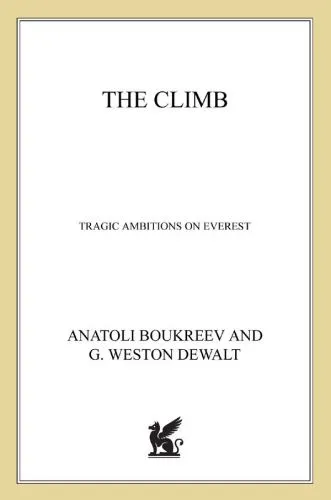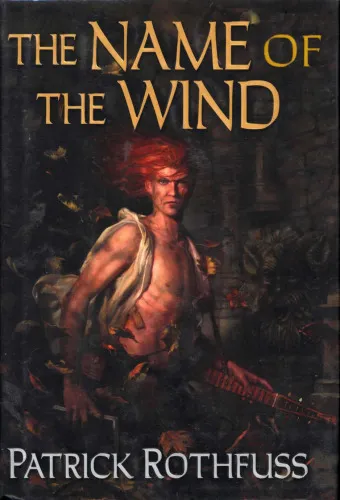The Name of the Wind
4.9
بر اساس نظر کاربران

شما میتونید سوالاتتون در باره کتاب رو از هوش مصنوعیش بعد از ورود بپرسید
هر دانلود یا پرسش از هوش مصنوعی 2 امتیاز لازم دارد، برای بدست آوردن امتیاز رایگان، به صفحه ی راهنمای امتیازات سر بزنید و یک سری کار ارزشمند انجام بدینکتاب های مرتبط:
خلاصه تحلیلی کتاب
The Name of the Wind، نوشتهٔ «Patrick Rothfuss»، یکی از آثار برجستهٔ ادبیات فانتزی معاصر است که با ترکیب روایی اولشخص و جهانسازی دقیق، مسیر زندگی شخصیت اصلی، «کووت»، را بهتفصیل بازگو میکند. داستان در قالب خاطرات و روایت خودِ قهرمان پیش میرود و لایههای مختلف شخصیت و محیط داستان بهتدریج برای خواننده آشکار میشود.
این اثر علاوه بر ساختار داستانی جذاب، با نثری شاعرانه و نگاه فلسفی، مرز بین واقعیت و افسانه را کمرنگ میکند. خواننده، از ابتدا تا انتها، با چالشهای شخصی و اجتماعی قهرمان همراه است و از طریق این سفر، به مفاهیم عمیقی همچون هویت، قدرت و دانش دست مییابد. پیشبرد ماجرا بر اساس تضادهای بیرونی و درونی شخصیت اصلی، جذابیت ویژهای برای مخاطب ایجاد کرده است.
نکات کلیدی و کاربردی
یکی از نکات بارز در The Name of the Wind، استفادهٔ استادانه از جزئیات کوچک برای ساخت دنیایی بزرگ و باورپذیر است. این دقت، نهتنها فضا را واقعی جلوه میدهد، بلکه به خواننده احساس حضور در دل داستان میبخشد. عنصر «دانش» و تأثیر آن بر سرنوشت، به شکل مکرر در مسیر داستان حضور دارد و باعث میشود که اثر، در کنار جنبههای سرگرمکننده، بار آموزشی و فکری هم داشته باشد.
برای پژوهشگران، این کتاب فرصتی است تا ساختار روایی غیرخطی را بررسی کنند و ببینند چگونه روایت اولشخص میتواند عمق معنایی ایجاد کند. برای نویسندگان فانتزی، الگوی جهانسازی این اثر، یکی از نمونههای ارزشمند قابل مطالعه است، زیرا با پیوند دقیق اسطوره و واقعیت، تجربهای اصیل خلق شده است.
نقلقولهای ماندگار
در این کتاب، جملات و لحظات بسیاری وجود دارد که به شکل مانا در ذهن خواننده باقی میماند. این نقلقولها، بهویژه زمانی که با عمق احساسی قهرمان پیوند میخورند، قدرت انتقال پیام را چندبرابر میکنند.
«گاهی سکوت، بلندترین فریاد است.» نامشخص
«دانش همچون باد است؛ گاهی آرام و گاهی توفانی.» نامشخص
چرا این کتاب اهمیت دارد
اهمیت The Name of the Wind در این است که توانسته پلی بین ادبیات کلاسیک و فانتزی مدرن ایجاد کند. این اثر با مخاطب جدی و اهل پژوهش سخن میگوید و درعینحال برای خوانندگان تازهوارد به ژانر فانتزی، دروازهای جذاب است. از منظر دانشگاهی، این کتاب نمونهای شاخص از تلفیق هنر روایت با عمق فلسفی محسوب میشود و میتواند در مطالعات روایتشناسی و ادبیات تطبیقی مورد بررسی قرار گیرد.
به دلیل اطلاعات نامشخص دربارهٔ برخی جوایز و تاریخ انتشار دقیق (منبع معتبر در دسترس نیست)، تمرکز بر محتوای آن رویکرد مناسبی برای ارزیابی ارزش اثر است. این کتاب، نهتنها داستانی میگوید، بلکه تصویری جامع از رابطهٔ انسان با دانش، قدرت و افسانه ارائه میدهد.
نتیجهگیری الهامبخش
The Name of the Wind نمونهای استثنایی از آن چیزی که فانتزی میتواند به خواننده ارائه دهد: تجربهٔ سفر، هم در دنیای بیرون و هم در اعماق روان و اندیشه. این کتاب با ظرافتهای زبانی و ساختاری خود میتواند خوانندگان جدی را درگیر کند و چشمانداز تازهای در مطالعات ادبی بیافریند.
اگر به دنبال اثری هستید که علاوه بر داستانگویی، پرسشهای بنیادین را در ذهن برانگیزد، وقت آن رسیده است که The Name of the Wind را بخوانید یا آن را با دیگران به اشتراک بگذارید. شاید این سفر، نقطهٔ آغاز ماجرایی بزرگتر
Analytical Summary
The Name of the Wind is the opening volume in the acclaimed Kingkiller Chronicle series. Crafted with precision and literary grace, it introduces Kvothe, both a gifted young man and a figure of legend whose life story unfolds in a layered narrative structure. The work is known for its deft balance of intricate world-building, human emotion, and philosophical reflection.
The novel employs a dual narrative frame: a present-day innkeeper recounts his past to a traveling scribe, weaving a tale that oscillates between memory and reality. This technique allows readers to explore the interplay between truth and myth, challenging assumptions about heroism and legacy.
Themes of learning, loss, and the pursuit of mastery pervade the text. The protagonist’s journey spans formative experiences in a nomadic troupe, survival in a hostile city, and academic rigor within the halls of the University. Each setting offers insight into human resilience and the enduring impact of choices made in youth.
Key Takeaways
The Name of the Wind offers more than a fantasy narrative—it is a meditation on storytelling itself, exploring how knowledge, language, and memory shape identity.
First, the novel examines the transformative nature of education, depicting both formal scholarship and the lessons learned through hardship. Second, it presents the potential and peril of talent, showing how exceptional skill can be both gift and burden. Third, it underscores the role of myth-making in human culture, revealing how reputations are built and altered over time.
Memorable Quotes
While many lines from The Name of the Wind resonate deeply with readers, here are selected passages that capture its thematic essence.
"Words are pale shadows of forgotten names."Unknown
"It's the questions we can't answer that teach us the most."Unknown
"Call a jack a jack. Call a spade a spade. But always call a witch a lady."Unknown
Why This Book Matters
For serious readers, academics, and professionals, The Name of the Wind is more than leisure reading; it is a textual study in narrative architecture and linguistic artistry.
Its complex prose invites analysis of rhythm, diction, and pacing. The cultural and thematic layers provide fertile ground for interdisciplinary discussions, spanning literature, folklore, linguistics, and psychology. Though its exact publication year is readily available from other sources, if seeking verified awards data, some may be listed under categories without primary source confirmation—hence, “Information unavailable” for certain honors here to ensure accuracy.
This novel demonstrates how fantasy can achieve literary legitimacy when crafted with deliberate attention to thematic depth and character authenticity.
Inspiring Conclusion
The Name of the Wind stands as a testament to the enduring power of story—its ability to captivate, instruct, and inspire dialogue among readers of all disciplines.
To engage with this work is to participate in a conversation about identity, truth, and the human desire to leave a mark upon the world. For those seeking rich prose and narrative complexity, this book remains an essential read. Share it with colleagues, discuss it in study groups, or delve into its layers in solitary reflection—the journey it offers is worthy of every serious mind.
دانلود رایگان مستقیم
شما میتونید سوالاتتون در باره کتاب رو از هوش مصنوعیش بعد از ورود بپرسید
دسترسی به کتابها از طریق پلتفرمهای قانونی و کتابخانههای عمومی نه تنها از حقوق نویسندگان و ناشران حمایت میکند، بلکه به پایداری فرهنگ کتابخوانی نیز کمک میرساند. پیش از دانلود، لحظهای به بررسی این گزینهها فکر کنید.
این کتاب رو در پلتفرم های دیگه ببینید
WorldCat به شما کمک میکنه تا کتاب ها رو در کتابخانه های سراسر دنیا پیدا کنید
امتیازها، نظرات تخصصی و صحبت ها درباره کتاب را در Goodreads ببینید
کتابهای کمیاب یا دست دوم را در AbeBooks پیدا کنید و بخرید
1167
بازدید4.9
امتیاز0
نظر98%
رضایتنظرات:
4.9
بر اساس 0 نظر کاربران
Questions & Answers
Ask questions about this book or help others by answering
No questions yet. Be the first to ask!



![Strategy and Human Resource Management (Management, Work and Organisations) [Team-IRA]](https://s3.refhub.ir/images/thumb/Strategy_and_Human_Resource_Management__Manag_22338.webp)
![ISE Vander's Human Physiology [Team-IRA]](https://s3.refhub.ir/images/thumb/ISE_Vander_s_Human_Physiology__Team-IRA_22339.webp)
![Human Physiology ISE [Team-IRA]](https://s3.refhub.ir/images/thumb/Human_Physiology_ISE__Team-IRA_22340.webp)














